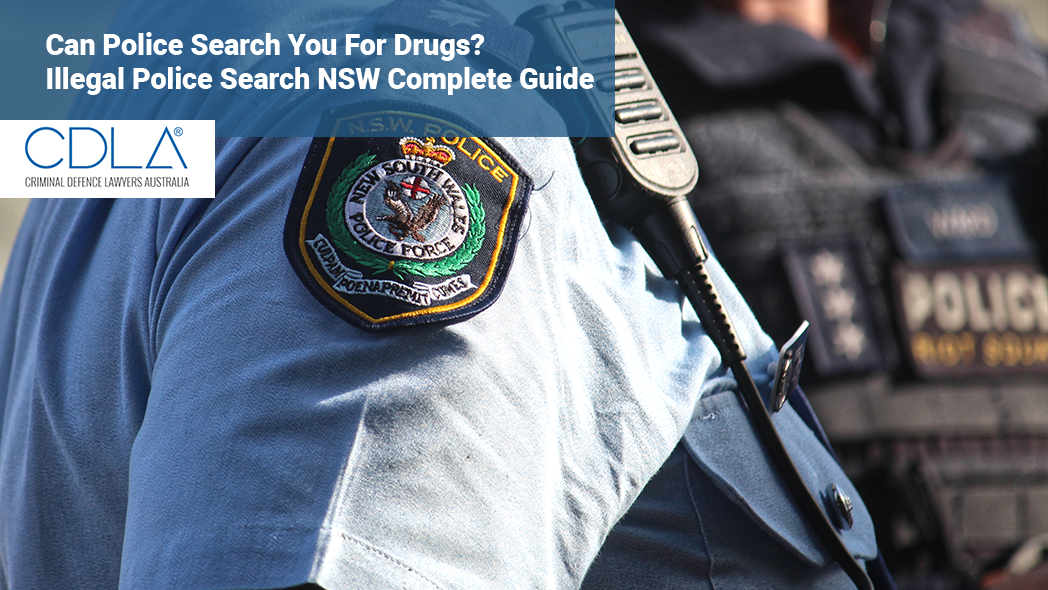Share This Article
image credit: Rose Makin
Key Takeaways
Police can search you, your property or your car if police have a valid warrant, if there’s a reasonable suspicion of drugs without a warrant, or if you consent. If these don’t apply, it will be an illegal police search which can amount to drug charges being dismissed. Here we outline common questions of can police search a parked car on private property, can police enter private property, and what amounts to an unreasonable search.
Police searches are a complex technical area of law. This article is a guide, and if you require specific advice, speak to our experienced drug lawyers Sydney based.
Illegal Police Search NSW | Can Police Search You for Drugs?
Generally, police can search you if you consent to being searched or if they form a reasonable suspicion you have drugs (without a warrant). The only other way you can be searched against your will is if they have a valid search warrant.
Section 21 LEPRA gives police the power to stop and search you without a warrant even if you don’t consent. They can do this only if police form a reasonable suspicion that you possess a prohibited drug or plant. If not, it is considered an illegal police search.
If the officer also reasonably suspects that you are concealing a drug in your mouth or hair, the officer can lawfully direct you to open your mouth or shake or move your hair to search that area. Failure to comply attracts a $550 find. However, police cannot forcibly open your mouth with their own hands.
Reasonable suspicion is if the police officer forms a suspicion that you have drugs on you, and that suspicion is based on reasonable grounds. The reasonable suspicion must be more than a mere possibility but can be less than a reasonable belief according to the case of R v Rondo [2001] NSWCCA 540.
If it turns out that the police found drugs on you after illegally searching you on the basis that there was actually no reasonable suspicion in the first place, the evidence of drugs found will be kicked out, resulting in a not guilty verdict.
This is because section 138 Evidence Act, allows the court to exclude evidence obtained as a result of illegal or improper police conduct.
What is an Unreasonable Search?
An unreasonable search is when a police officer searches you with no reasonable suspicion that you have drugs on you. It is illegal to search you, if a police officer suspects you have drugs on you but where that suspicion lacks reasonable grounds to forming that suspicion.
An example of an unreasonable search is a search as a result of the police believing the mere possibility that you have drugs on you. Mere possibility is insufficient grounds to search without a warrant.
What is Considered an Illegal Search and Seizure?
An illegal search and seizure occur when police search you without a proper basis to do so. This includes, if there is no warrant, or there has been no consent to search by the person about to be searched, or there is no reasonable suspicion to search without a warrant. All of these circumstances amount to an illegal search and seizure, which may result in charged being dropped early or dismissed in court.
Can Police Search a Parked Car on Private Property?
Ordinarily, police can search a parked car on private property if the owner consents. The other way a parked car on private property can be searched is if police have a warrant. If the car is parked on private property, and where there is no warrant or consent, police are not permitted to enter the private property unless the Part 2 (emergency powers), or Part 6 (domestic violence purposes) applies to the case under the Law Enforcement (Powers and Responsibilities) Act 2002 (NSW). Once a police officer is lawfully on private property, they may search a parked car on the property without a warrant or consent if the officer suspects on reasonable grounds that the vehicle contains anything stolen, unlawfully obtained, used in connection with an offence, contains anything used in connection with an offence, contains a dangerous article in it, or contains drugs.
Can Police Enter Private Property?
Police may enter private property without a warrant or consent under section 10 Law Enforcement (Powers and Responsibilities) Act 2002 (NSW) if the officer needs to enter and stay for a reasonable time on premises to arrest a person; or detain a person. This can happen only if the officer believes on reasonable grounds that the person to be arrested or detained is on the private property.
Other ways that police can lawfully enter private property is with a valid warrant or consent, or under Part 2 or 6 of the Law Enforcement (Powers and Responsibilities) Act 2002 (NSW) (LEPRA).
What Violates the 4th Amendment?
The 4th amendment of the American Constitution is the right of the people to be secure in their person, house, papers and effects, against unreasonable searches and seizures. This amendment provides that these rights shall not be violated. An illegal search will violate the 4th Amendment of the American Constitution.









